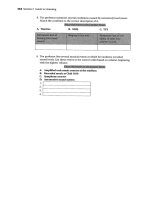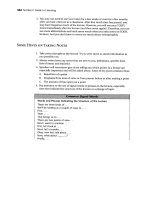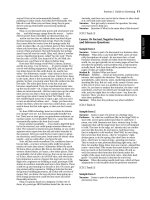Tài liệu The Complete Guide to Buying and Selling Apartment Buildings Chapter 11-12 doc
Bạn đang xem bản rút gọn của tài liệu. Xem và tải ngay bản đầy đủ của tài liệu tại đây (84.01 KB, 18 trang )
Closing the Deal
To put the world right in order, we must first put the nation in order; to put the
nation in order, we must first put the family in order; to put the family in order,
we must first cultivate our personal life; we must first set our hearts right.
—CONFUCIUS
A
fter securing financing for your
property, the next step is to prepare to finalize and close the transaction.
Depending on the size of your acquisition, the closing process can be fairly
simple and straightforward, or it can be quite involved, with extensive doc-
umentation required. It is also time to begin planning and defining what
your role as a strategic manager will be. This, too, will depend on the size
of the transaction, as well as your level of experience.
215
CHAPTER 11
Closing Fundamentals
The closing process is the time when everything comes together to finalize
your transaction. You have studied the market and analyzed numerous apart-
ment buildings, you have successfully negotiated terms and conditions accept-
able to both you and the seller, and you have sought out the best financing
alternative for your property. It is now time to bring all the parties together to
close the sale. Before you do so, however, there are several factors to consider
that may affect the closing. They include a thorough review of all related clos-
ing documents, a final inspection of the property, and the timing of the close.
Closing Documents
While numerous ancillary closing forms and letters will need your attention,
the primary closing documents that will require a careful review are the title
report, closing statement, deed of trust, and promissory note.
The title report, also known as the abstract of title, provides information about
the property’s chain of title. In other words, it gives a history of ownership,
judgments, liens, and anything else that may have been recorded against the
property over time. The title insurance company issues an insurance policy to
the buyer and a separate policy to the lender that ensures the title is clean and
there are no encumbrances that may adversely affect the new owner.
Closing statements, also known as settlement statements, are commonly pre-
pared by the title company handling the closing. They detail by line item all
of the associated debits and credits assessed to both buyer and seller, such as:
■
Contract sales price
■
Earnest money deposit
THE COMPLETE GUIDE TO BUYING AND SELLING APARTMENT BUILDINGS
216
■
Principal amount of new loan(s)
■
Existing loan(s)
■
Seller financing
■
Prorated tax adjustments
■
Prorated rent adjustments
■
Tenants’ deposits
■
Lender fees
■
Title fees
■
Attorney fees
You should take the necessary time to review each charge on the settlement
statement and verify its accuracy. I cannot think of a deal that I have been
involved in where all settlement charges on the closing statement were com-
pletely accurate. Errors are inadvertently made for one reason or another.
For example, the title company may have an incorrect payoff amount for the
seller’s loan, or it may prorate the rents or taxes incorrectly, or it may not be
aware of a credit you are entitled to because of a specific clause in your pur-
chase agreement negotiated by you and the seller.
Do not assume that because the closing officer works at the title company
and acts as the facilitator in numerous closings, the officer must be right
because the closer should know. Precisely the opposite is true. The fact that
the closer does act as the facilitator in numerous closings is all the more rea-
son that he or she must rely on you to provide accurate information for the
settlement statement. The inherent risk to you by neglecting to review the
closing statement can be substantial and potentially cost you hundreds or
even thousands of dollars.
The lender is responsible for preparing the deed of trust and the promissory
note. These documents outline the terms and conditions under which the
217
Closing the Deal
lender has agreed to loan you money. Repayment terms are specified,
including the amount of the loan, the interest rate and amortization period,
and any prepayment penalties that may be imposed. Other lender require-
ments that may also be included are escrow conditions for taxes and insur-
ance, minimum insurance amounts, standard of care for property condition,
and default provisions.
Many years ago, when I was first getting started in real estate, I bought my
first two single-family rental houses. The seller owned 10 or 12 rental prop-
erties and was beginning to sell some of them. He offered each of the two
houses that I bought for a sales price of $23,000, with only $1,000 down. In
addition, the seller wanted to defer the gain on sale for tax purposes, so he
was also willing to provide owner financing. Because I was buying both
properties from the same seller at the same time, it was only natural to close
on both houses at the same time with the same closing officer. The closing
went smoothly, and, as far as I knew, everything appeared to be in order.
However, when I decided to sell the properties years later, I discovered that
the legal descriptions were mixed up and had accidentally been switched in
several of the closing documents. This was an easy mistake for anyone to
make, but one that should have been caught by either the closing officer, the
seller, myself, or all three of us. Rectifying the mistake ended up costing me
several hundred dollars in attorney fees.
To help avoid some of the problems that can occur in closings, some lenders
may require you to sign what is commonly known as an attorney opinion let-
ter. It is often prepared by the lender’s attorney and subsequently forwarded
to your attorney. The letter serves two primary functions. First, it forces
you, as the borrower, to review all of the pertinent and relative language
affecting the transaction with your attorney. Your attorney will advise you
regarding the legal content and may recommend changes to help protect
you. By signing the attorney opinion letter, you are stating that you under-
stand all of the legal documents and that you are in agreement with them. By
THE COMPLETE GUIDE TO BUYING AND SELLING APARTMENT BUILDINGS
218
taking time to have a competent attorney review these documents, you will
minimize your exposure to risk from any inadvertent errors, such as the
ones previously discussed. Second, an attorney opinion letter serves to
indemnify and hold harmless the lender. By outlining all of the terms and
conditions and by requiring you to review them with an attorney, the lender
is effectively adding an extra measure of self-protection.
Final Inspection
Several days before the closing, you should take the necessary precaution of
performing one final physical inspection of the apartment building. Doing so
could potentially save you thousands of dollars. On one particular acquisition
I was involved in, a cracked slab was discovered on one of the buildings about
two weeks before the scheduled closing. The weather had been extremely hot
and arid that summer, with no rain for several weeks. The soil below the foun-
dation (which was a cement slab; there was no basement) had completely
dried up due to the lack of moisture in the ground. This caused a portion of
the building’s foundation to settle downward and subsequently crack. Fortu-
nately for me, this incident occurred before I took possession of the property.
While this was an unfortunate incident for the seller, he knew he had an obli-
gation to repair the foundation at his expense. A repair crew was called out to
lift up the settled portion of the slab with hydraulic jacks and then pour sev-
eral cement footings underneath to support the building. Although I did not
see the final bill for the repair work, I am sure it was not cheap.
Closing Credits Can Add Up
Closing credits most often consist of prorated credits for rental income,
security deposits, and taxes. The time of month your closing is held can have
219
Closing the Deal
a significant impact on the credits you are entitled to as a buyer. Suppose
you close on the very first day of the month. Although you would technically
be entitled to receive the full month’s rent at the time of closing, assuming
rents are due on the first of the month, chances are the seller will have col-
lected very little of the rental income yet. Most landlords provide a two- to
three-day grace period before rents are considered late. If the seller were to
give credit for the full month, this would put the seller in the precarious
position of having to collect the remainder of the rent after the date of clos-
ing when he or she is no longer the owner. It is better to wait until the fifth
of the month or so. By then, over 95 percent of all rents should have been
collected and as the buyer, you will be entitled to receive a prorated credit
for 25 days’ worth of rent without having to expend the time and effort to
collect them. Depending on the monthly revenues generated by the apart-
ment complex, the credit due from rents collected can be quite substantial.
Take a look at the following example:
100 units × $600/unit average rent = $60,000/month
× $60,000 = $50,000 closing credit for rental income
Conversely, closing at the end of the month, say on the twenty-eighth,
would have the following effect:
100 units × $600/unit average rent = $60,000/month
× $60,000 = $4,000 closing credit for rental income
By studying this simple example, you can see the potential impact of closing
at the beginning of the month versus closing at the end of the month. In this
case, you would have had to come to the closing table with $46,000 less by
closing on the fifth rather than the twenty-eighth. I should mention that a
2
ᎏ
30
25
ᎏ
30
THE COMPLETE GUIDE TO BUYING AND SELLING APARTMENT BUILDINGS
220
prepaid interest payment to the lender would be greater at the beginning of
the month, which would partially offset the difference collected in rental
income. In this example, the prepaid interest would be around $12,000 to
$14,000, so you would still come out ahead by more than $32,000.
While timing does affect the amount of rental income received at closing, it
has no effect on the credit you are entitled to for security deposits. As with
the rental income credit, however, this can also be quite substantial. Using
the same 100-unit apartment building example from before, assume an
average security deposit of $300:
100 units × $300 average security deposit = $30,000
Now assume the seller required a security deposit equal to the first and last
months’ rent:
100 units × $600/unit average rent × 2 = $120,000
Keep in mind that although you will receive a credit at closing in the form of
cash, there is an offsetting liability equal to the credit received. The money
you receive at closing really belongs to the tenants; however, because they
move in and out over a period of time, the cash flow from operations is not
materially affected. As old tenants move out and are reimbursed for their
security deposits, new tenants move in and replace the funds. The primary
benefit to you as the buyer is received at the time of closing when the trans-
fer of the asset (cash) is made.
Depending on the area where the property you purchase is located and also
on the lender’s specific requirements, you will either receive a credit, give
the seller a credit, give the lender a credit, or some combination of these. I
have purchased property both in areas where taxes are paid in arrears and in
areas where taxes are paid in advance. In the case of the former, you will
221
Closing the Deal









